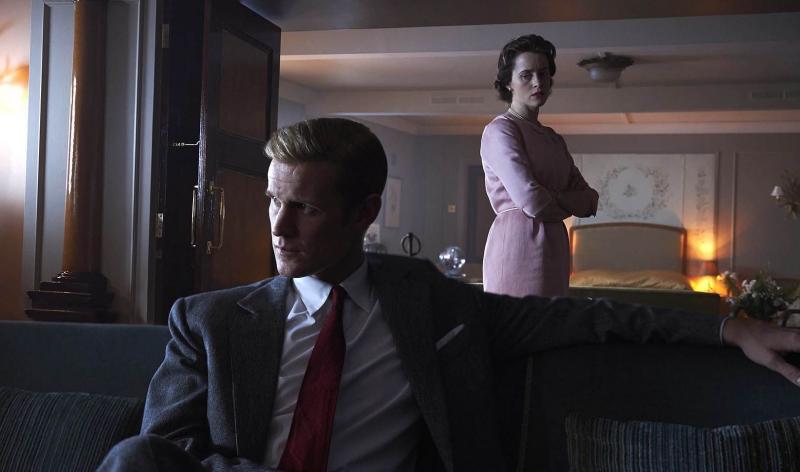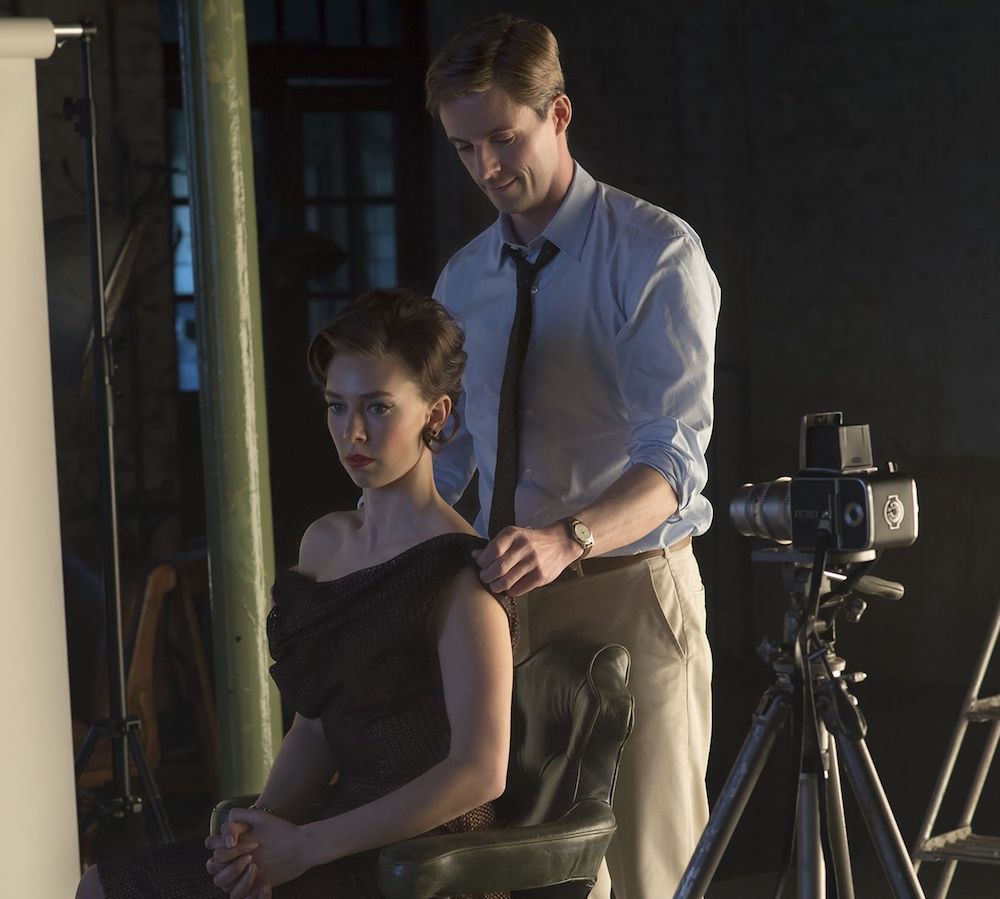The Crown, Series 2, Netflix review - all our yesterdays, cunningly rewritten | reviews, news & interviews
The Crown, Series 2, Netflix review - all our yesterdays, cunningly rewritten
The Crown, Series 2, Netflix review - all our yesterdays, cunningly rewritten
Private passions and public crises batter the royal household

Beneath the creamy overlay of gowns, crystal chandeliers, palaces, uniformed flunkies and a sumptuous (albeit CGI-enhanced) Royal Yacht, a steely pulse of realpolitik fuels The Crown, returning to Netflix for its much-anticipated second series.
It’s our collective past so we ought to have heard it all before, but Morgan’s get-out-of-jail card is the way he avoids the trap of getting boxed in by the dry architecture of history and stretches his drama into the realms of what-if and did-they-really? It works to his advantage that so much of the royal family’s history has managed to remain off the official record, even though everyone has a pretty good idea of what really went on. Or so they think.
 A case in point is Philip’s rumoured extra-marital activity, which is taken for granted in an anecdotal kind of way, but somehow never pinned down to specific names, dates and times. Series two opens with Philip (Matt Smith) and Elizabeth (Claire Foy) having a crisis meeting in Lisbon in an attempt to fend off a landslide of inflammatory press reports, and we get an intimate playwright’s-eye-view of the kind of things they discussed. Probably. The Queen tells her husband that “you’re lost in your role and you’re lost in yourself.” He replies that he hates being infantilised and humiliated by the Palace lackeys, whom he refers to as “the moustaches”. Happily, this will in due course prompt the reappearance of the cold-eyed, black-hearted Palace fixer Tommy Lascelles, played with best-eaten-cold relish by Pip Torrens.
A case in point is Philip’s rumoured extra-marital activity, which is taken for granted in an anecdotal kind of way, but somehow never pinned down to specific names, dates and times. Series two opens with Philip (Matt Smith) and Elizabeth (Claire Foy) having a crisis meeting in Lisbon in an attempt to fend off a landslide of inflammatory press reports, and we get an intimate playwright’s-eye-view of the kind of things they discussed. Probably. The Queen tells her husband that “you’re lost in your role and you’re lost in yourself.” He replies that he hates being infantilised and humiliated by the Palace lackeys, whom he refers to as “the moustaches”. Happily, this will in due course prompt the reappearance of the cold-eyed, black-hearted Palace fixer Tommy Lascelles, played with best-eaten-cold relish by Pip Torrens.
Liz makes it clear that “divorce is not an option”, but asks wilting Phil what it will take to keep him committed to their marriage. When she then signs him up to be her stand-in on a five-month tour of far-flung Commonwealth territories, the inference, should you choose to draw it, is that she may have taken the pragmatic view that (as somebody puts it) “what happens on tour stays on tour”. She couldn’t have foreseen that Philip’s closest aide, Mike Parker, would doltishly let the cat out of the bag by putting some of their laddish escapades in writing. Frequently, Foy is left to depict the Queen’s feelings in long, dialogue-free shots in which emotions seem to pass across her face like breezes ruffling still water.
Meanwhile it’s 1956, so as Phil wends his way towards Melbourne to open the Olympic Games, Prime Minister Anthony Eden has made a calamitously inept decision to invade Egypt and take back the Suez canal, which has been seized by General Nasser. The episode is deftly covered with just enough scene-setting shots of bombers, tanks and paratroopers, but the real juice is in the scalpel-sharp portraits of the chief protagonists.
 Eden (Jeremy Northam) is depicted as a vain, petulant snob, entering into a disastrous secret alliance with France and the Israelis to satisfy his personal pique against Nasser. Waiting to strike at Eden, who's already seriously ill, is Chancellor Harold Macmillan, played with knife-under-the-coat guile by Anton Lesser, who first seems to pander to Eden’s urge for war, then turns against him when the adventure turns into a catastrophe. In time, we learn more about Macmillan, not least his wife’s decades-long affair with Bob Boothby. When he becomes Eden’s replacement, and tries to pass off Suez as “Eden’s war”, he’s sharply reminded by the monarch that he originally backed the invasion and was part of the government’s collective decision to launch it. Morgan made an odd comment to Radio Times that the Queen is “of limited intelligence”, but you’d conclude from watching this that she was tough and smart.
Eden (Jeremy Northam) is depicted as a vain, petulant snob, entering into a disastrous secret alliance with France and the Israelis to satisfy his personal pique against Nasser. Waiting to strike at Eden, who's already seriously ill, is Chancellor Harold Macmillan, played with knife-under-the-coat guile by Anton Lesser, who first seems to pander to Eden’s urge for war, then turns against him when the adventure turns into a catastrophe. In time, we learn more about Macmillan, not least his wife’s decades-long affair with Bob Boothby. When he becomes Eden’s replacement, and tries to pass off Suez as “Eden’s war”, he’s sharply reminded by the monarch that he originally backed the invasion and was part of the government’s collective decision to launch it. Morgan made an odd comment to Radio Times that the Queen is “of limited intelligence”, but you’d conclude from watching this that she was tough and smart.
She is also doggedly conservative in her behaviour, and likes to curl up in bed alongside her husband and read books about horse breeding. By contrast, her sister Margaret (Vanessa Kirby) has already fast-forwarded into the Sixties, succumbing to the brazen charms of photographer Anthony Armstrong-Jones (Matthew Goode, pictured above trying his luck with Kirby), who has made her feel like a natural woman by giving her exciting rides on his motorbike and asking her impertinent personal questions. The future Lord Snowdon shoots from (and for) the hip in black and white, and has no patience with the old fairytale-style royals, as floridly pictured by Cecil Beaton. “I’m sorry, but Cecil is a disgrace,” he tells Mags. There’s a whiff of revolution in the air.
Add comment
The future of Arts Journalism
You can stop theartsdesk.com closing!
We urgently need financing to survive. Our fundraising drive has thus far raised £49,000 but we need to reach £100,000 or we will be forced to close. Please contribute here: https://gofund.me/c3f6033d
And if you can forward this information to anyone who might assist, we’d be grateful.

Subscribe to theartsdesk.com
Thank you for continuing to read our work on theartsdesk.com. For unlimited access to every article in its entirety, including our archive of more than 15,000 pieces, we're asking for £5 per month or £40 per year. We feel it's a very good deal, and hope you do too.
To take a subscription now simply click here.
And if you're looking for that extra gift for a friend or family member, why not treat them to a theartsdesk.com gift subscription?
more TV
 theartsdesk Q&A: Suranne Jones on 'Hostage', power pants and politics
The star and producer talks about taking on the role of Prime Minister, wearing high heels and living in the public eye
theartsdesk Q&A: Suranne Jones on 'Hostage', power pants and politics
The star and producer talks about taking on the role of Prime Minister, wearing high heels and living in the public eye
 King & Conqueror, BBC One review - not many kicks in 1066
Turgid medieval drama leaves viewers in the dark
King & Conqueror, BBC One review - not many kicks in 1066
Turgid medieval drama leaves viewers in the dark
 Hostage, Netflix review - entente not-too-cordiale
Suranne Jones and Julie Delpy cross swords in confused political drama
Hostage, Netflix review - entente not-too-cordiale
Suranne Jones and Julie Delpy cross swords in confused political drama
 In Flight, Channel 4 review - drugs, thugs and Bulgarian gangsters
Katherine Kelly's flight attendant is battling a sea of troubles
In Flight, Channel 4 review - drugs, thugs and Bulgarian gangsters
Katherine Kelly's flight attendant is battling a sea of troubles
 Alien: Earth, Disney+ review - was this interstellar journey really necessary?
Noah Hawley's lavish sci-fi series brings Ridley Scott's monster back home
Alien: Earth, Disney+ review - was this interstellar journey really necessary?
Noah Hawley's lavish sci-fi series brings Ridley Scott's monster back home
 The Count of Monte Cristo, U&Drama review - silly telly for the silly season
Umpteenth incarnation of the Alexandre Dumas novel is no better than it should be
The Count of Monte Cristo, U&Drama review - silly telly for the silly season
Umpteenth incarnation of the Alexandre Dumas novel is no better than it should be
 The Narrow Road to the Deep North, BBC One review - love, death and hell on the Burma railway
Richard Flanagan's prize-winning novel becomes a gruelling TV series
The Narrow Road to the Deep North, BBC One review - love, death and hell on the Burma railway
Richard Flanagan's prize-winning novel becomes a gruelling TV series
 The Waterfront, Netflix review - fish, drugs and rock'n'roll
Kevin Williamson's Carolinas crime saga makes addictive viewing
The Waterfront, Netflix review - fish, drugs and rock'n'roll
Kevin Williamson's Carolinas crime saga makes addictive viewing
 theartsdesk Q&A: writer and actor Mark Gatiss on 'Bookish'
The multi-talented performer ponders storytelling, crime and retiring to run a bookshop
theartsdesk Q&A: writer and actor Mark Gatiss on 'Bookish'
The multi-talented performer ponders storytelling, crime and retiring to run a bookshop
 Ballard, Prime Video review - there's something rotten in the LAPD
Persuasive dramatisation of Michael Connelly's female detective
Ballard, Prime Video review - there's something rotten in the LAPD
Persuasive dramatisation of Michael Connelly's female detective
 Bookish, U&Alibi review - sleuthing and skulduggery in a bomb-battered London
Mark Gatiss's crime drama mixes period atmosphere with crafty clues
Bookish, U&Alibi review - sleuthing and skulduggery in a bomb-battered London
Mark Gatiss's crime drama mixes period atmosphere with crafty clues
 Too Much, Netflix - a romcom that's oversexed, and over here
Lena Dunham's new series presents an England it's often hard to recognise
Too Much, Netflix - a romcom that's oversexed, and over here
Lena Dunham's new series presents an England it's often hard to recognise

Comments
Always a treat to read Adam